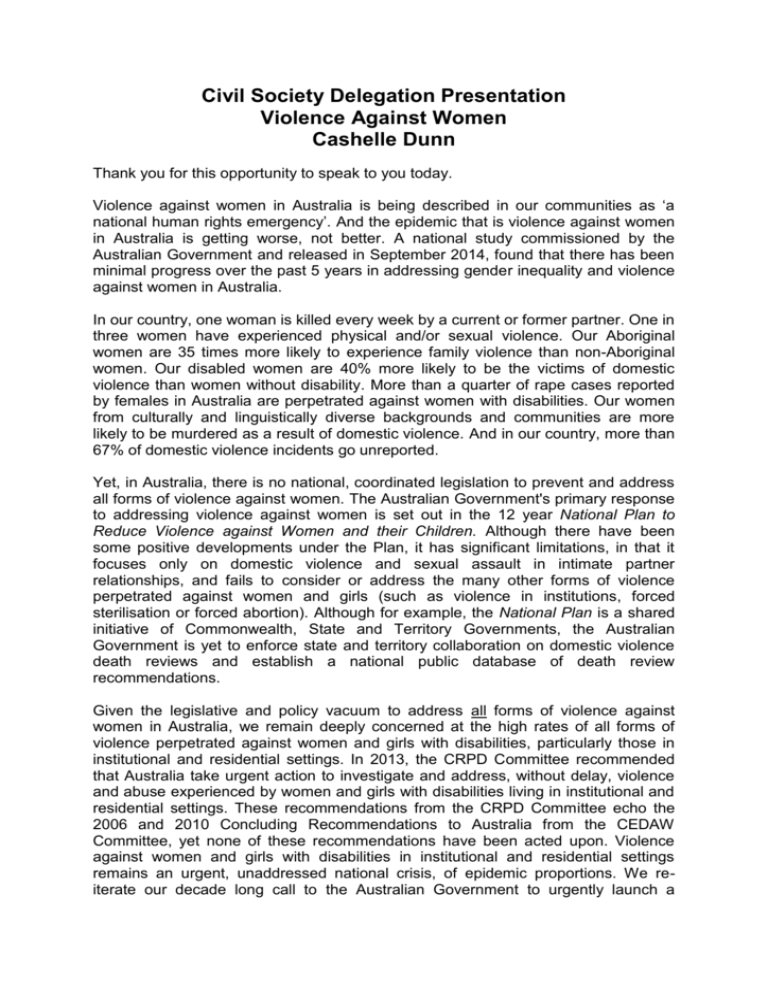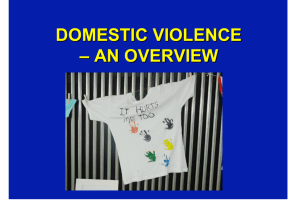
Civil Society Delegation Presentation
Violence Against Women
Cashelle Dunn
Thank you for this opportunity to speak to you today.
Violence against women in Australia is being described in our communities as ‘a
national human rights emergency’. And the epidemic that is violence against women
in Australia is getting worse, not better. A national study commissioned by the
Australian Government and released in September 2014, found that there has been
minimal progress over the past 5 years in addressing gender inequality and violence
against women in Australia.
In our country, one woman is killed every week by a current or former partner. One in
three women have experienced physical and/or sexual violence. Our Aboriginal
women are 35 times more likely to experience family violence than non-Aboriginal
women. Our disabled women are 40% more likely to be the victims of domestic
violence than women without disability. More than a quarter of rape cases reported
by females in Australia are perpetrated against women with disabilities. Our women
from culturally and linguistically diverse backgrounds and communities are more
likely to be murdered as a result of domestic violence. And in our country, more than
67% of domestic violence incidents go unreported.
Yet, in Australia, there is no national, coordinated legislation to prevent and address
all forms of violence against women. The Australian Government's primary response
to addressing violence against women is set out in the 12 year National Plan to
Reduce Violence against Women and their Children. Although there have been
some positive developments under the Plan, it has significant limitations, in that it
focuses only on domestic violence and sexual assault in intimate partner
relationships, and fails to consider or address the many other forms of violence
perpetrated against women and girls (such as violence in institutions, forced
sterilisation or forced abortion). Although for example, the National Plan is a shared
initiative of Commonwealth, State and Territory Governments, the Australian
Government is yet to enforce state and territory collaboration on domestic violence
death reviews and establish a national public database of death review
recommendations.
Given the legislative and policy vacuum to address all forms of violence against
women in Australia, we remain deeply concerned at the high rates of all forms of
violence perpetrated against women and girls with disabilities, particularly those in
institutional and residential settings. In 2013, the CRPD Committee recommended
that Australia take urgent action to investigate and address, without delay, violence
and abuse experienced by women and girls with disabilities living in institutional and
residential settings. These recommendations from the CRPD Committee echo the
2006 and 2010 Concluding Recommendations to Australia from the CEDAW
Committee, yet none of these recommendations have been acted upon. Violence
against women and girls with disabilities in institutional and residential settings
remains an urgent, unaddressed national crisis, of epidemic proportions. We reiterate our decade long call to the Australian Government to urgently launch a
national inquiry into violence against people with disabilities in residential and
institutional settings.
We remain deeply concerned that forced sterilisation of women and girls with
disabilities is a practice that remains legal and sanctioned by Governments in
Australia. Since 2005, the United Nations treaty monitoring bodies have consistently
and formally recommended that the Australian Government enact national legislation
prohibiting the use of sterilisation of boys and girls with disabilities, and of adults with
disability in the absence of their prior, fully informed and free consent. Yet these
recommendations have to date, been ignored.
We express our concern at the significant increase in the use of forced/involuntary
electroshock (ECT) on women in Australia, including on very young women. Nearly
three times as many women are receiving involuntary ECT compared with men. Civil
society organisations have called on the Australian Government to conduct an
urgent national Inquiry into the use of forced and/compulsory medical and psychiatric
treatments and interventions on people with disabilities. The CRPD Committee has
also recently recommended that Australia “repeal all legislation that authorises
medical interventions without free and informed consent of the persons with
disabilities concerned”.
Thank you.









